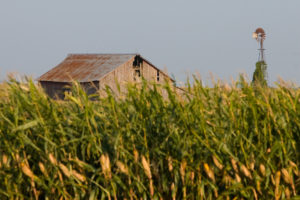 Farmer Dawson kept missing some corn that was taken every few nights from the crib in his barn, although the door was well secured with lock and key.
Farmer Dawson kept missing some corn that was taken every few nights from the crib in his barn, although the door was well secured with lock and key.
“Who can have stolen it?” asked his wife.
“It’s that lazy Tom Slocum,” he said. ” I’ve suspected him all the time, and I won’t bear it any longer!”
“What makes you think it’s Tom?” she asked.
“Because he’s the only man around who hasn’t any com, or anything else, indeed. He spent last summer in the saloons, while his neighbors were at work. Now they have plenty, and he has nothing.”
“But his family are suffering,” said the wife. “They are sick, and in need of food and medicine. Don’t you think we ought to help them?”
“No!” said the farmer; “for if he finds that we take care of his family, it will encourage him to spend the next summer as he spent the last. The best thing will be to send him to jail, and his family to the poorhouse, and this is what I’m going to do. I’ve laid a plan to trap him this very night.”
His wife pleaded earnestly with him for Tom’s poor family, and begged him to try the Scriptural rule of heaping coals of fire on his head, by showing him kindness. As her husband w;ent out of the house, she said, — “Do try the coals of fire first.”
The farmer went to examine his barn and find out how the corn was stolen. Very soon he found a hole near the crib, large enough for a man to put his hand through. So he set a trap inside of the hole, which would catch the thief’s hand as soon as it was put through the hole, and keep him there till the trap was unfastened.
Early the next morning he started for the barn to see what had taken place. On his way there he said to himself, “Shall I try my plan or my wife’s? Will the jail or the coals of fire be the best? I think I’ll try the coals.”
On reaching the barn he found Tom Slocum, with his arm through the hole, and his hand caught in the trap.
“Hello, neighbor, what are you doing here?” he asked.
Poor Tom felt too much ashamed to say anything. Farmer Dawson loosed his hand from the trap, and, taking Tom’s sack, told him to hold it, while he filled it with the grain which he desired.
“There, Tom, take that,” said the farmer; “and, after this, when you want corn, come to me, and I will let you have it on trust, or for work. I need another hand on the farm, and will give you steady work with good wages.”
“Oh, sir!” said Tom, quite overcome, “I’ve been wanting work, but no one would hire me. My family is suffering, and I am ashamed to beg.”
“Very well, Tom,” said the farmer. “Now take this corn to the mill, and make things comfortable about home today, and tomorrow we’ll begin. But there’s one thing we must agree about first.”
Tom looked at him earnestly, as if he meant to say, “And what’s that?”
“You must let whisky alone,” said the farmer, “and promise me never to take another drop.”
The tears sprang into Tom’s eyes, and his voice trembled as he said, “You’ve been so kind to me that I am willing to do anything you ask me. I make the promise now, and by the help of God I’ll try to keep it.”
Farmer Dawson took Tom to the house and gave him his breakfetst, while his wife put up a basket of food for the suffering family in the poor man’s home.
Tom went to work the next day, and kept steadily on with it. He stopped drinking and stealing, attended church and Sunday school with his family, and became a respectable and useful member of society.
“How changed Tom Slocum is from what he once was!” said the farmer’s wife one day.
“Yes,” replied her husband; “it was the coals of fire that did it.”

Leave a Reply